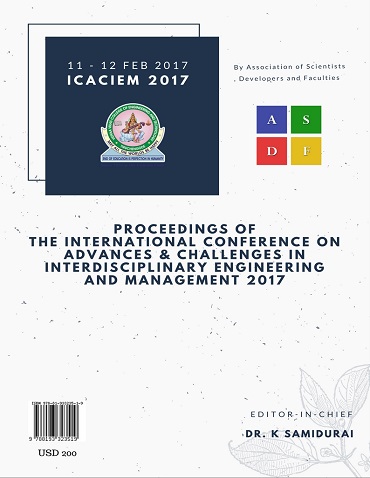- Publication Meta:Value
- Short Title:ICACIEM 2017
- Publisher:ASDF, India
- ISBN 13:978-81-933235-1-9
- ISBN 10:81-933235-1-3
- Language:English
- Type:Hard Bound - Printed Book
- Copyrights:ICACIEM Organizers / DCRC, London, UK
- Editor-in-Chief:Dr K Samidurai
- Conference Dates:11 - 12, February 2017
- Venue Country:Tiruchengode, India
- Submitted Papers:589
- Acceptance Rate:8.12%
- Website:www.icaciem.org
Welcome to ASDF Electronic Digital Library!
ICACIEM 2017
ICACIEM 2017
International Conference on Advances & Challenges in Interdisciplinary Engineering and Management 2017
Paper 011
Breath an Adaptive Protocol for Industrial Control Applications Using Wireless Sensor Networks
M Saranya1
1Assistant Professor, Department of ECE, Vidyaa Vikas College of Engineering and Technology, Tiruchengode, India
Abstract
An energy-efficient, reliable and timely data transmission is essential for Wireless Sensor Networks (WSNs) employed in scenarios where plant information must be available for control applications. The protocol is based on randomized routing, medium access control, and duty-cycling jointly optimized for energy efficiency. The design approach relies on a constrained optimization problem, whereby the objective function is the energy consumption and the constraints are the packet reliability and delay. The optimal working point of the protocol is achieved by a simple algorithm, which adapts to traffic variations and channel conditions with negligible overhead. The protocol has been implemented and experimentally evaluated on a test bed with off-the-shelf wireless sensor nodes, and it has been compared with a standard IEEE 802.15.4 solution. Analytical and experimental results show that Breath is tuneable and meets reliability and delay requirements. Breath exhibits a good distribution of the working load, thus ensuring a long lifetime of the network. Therefore, Breath is a good candidate for efficient, reliable, and timely data gathering for control applications.
Keywords
Author's Profile
Author profile can be generated and linked through our partners World Book of Researchers. To include your profile online Click Here. After it is approved, please email to edlib @ asdf.res.in to create a link with all the papers.
e-AID
ICACIEM.2017.011
Cite this Article as Follows
M Saranya. Breath an Adaptive Protocol for Industrial Control Applications Using Wireless Sensor Networks. International Conference on Advances & Challenges in Interdisciplinary Engineering and Management (2017): 06. Print.
© 2010 - by EDLIB .
All Rights Reserved.

